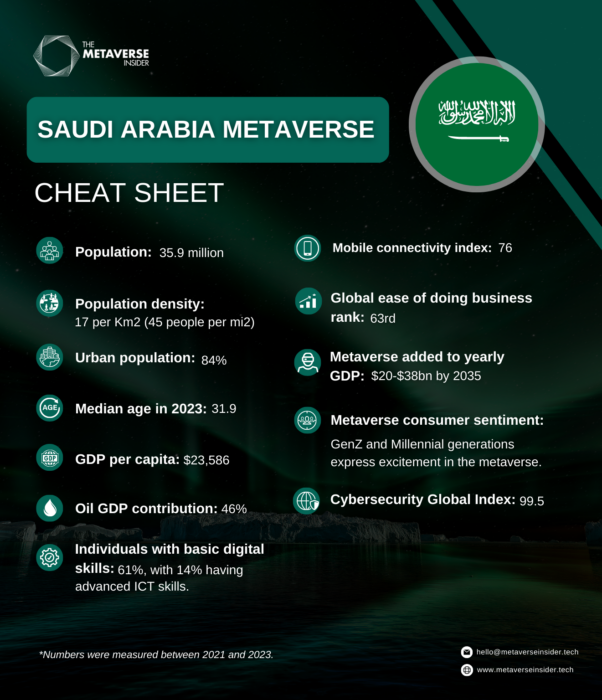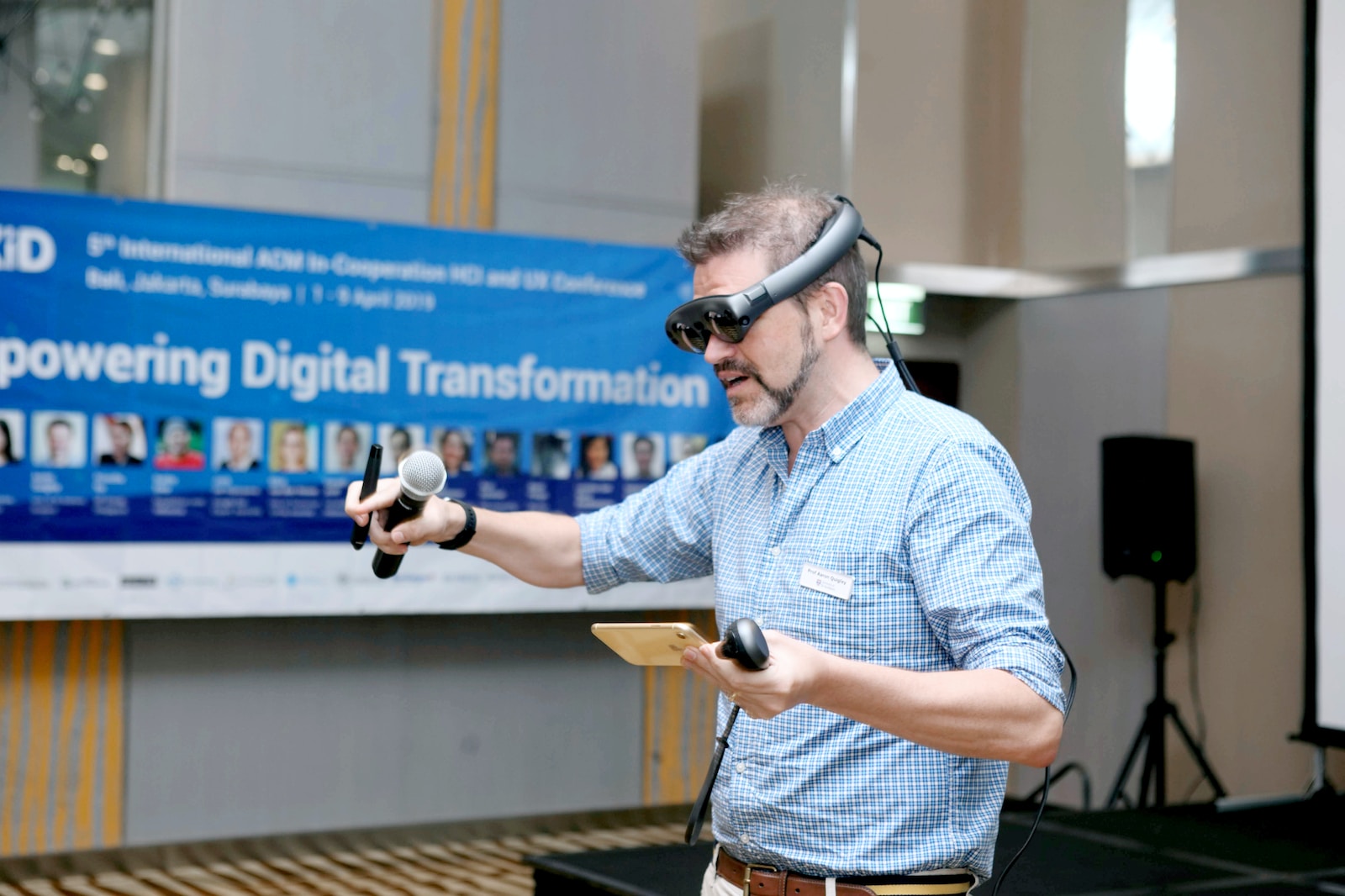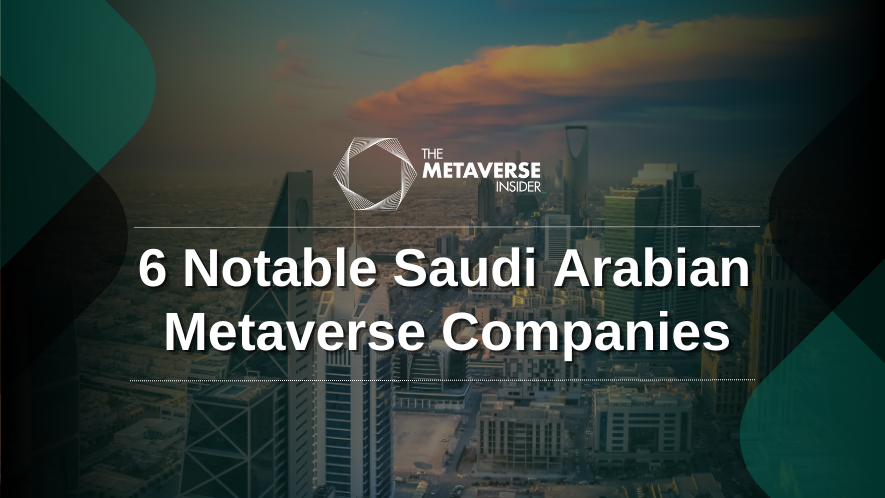This article is the second in my series on the most prominent Middle Eastern countries paving the way for the Metaverse Nexus: this one covers the metaverse in Saudi Arabia and why they are a global investment leader.
In the first article, we looked at the United Arab Emirates, concluding the Arab nation is the general leader in the Metaverse Nexus within Saudi Arabia.
For the Kingdom of Saudi Arabia (KSA), we will cover the evolving digital infrastructure, increasing investments, metaverse success stories, and government motivation toward the Metaverse Nexus.

To that end, the Metaverse Nexus is a contemporary and more precise interpretation of the technology area in question. The framework is guided by two objectives: feasibility, which conveys the tangible benefits garnered by individuals, businesses, and industries while accommodating the metaverse’s continually evolving nature.
With these goals in mind, a conceptualization was birthed into three distinct yet intrinsically linked corresponding circles: social metaverse, enterprise metaverse, and industrial metaverse. Three spheres hold numerous use cases individually, but when intersecting, they produce complex interplays and variations.
If the concept of the Metaverse Nexus in Saudi Arabia piques your curiosity, see our keystone article below.

State of Metaverse in Saudi Arabia

Saudi Arabia is a global investment leader in deep tech
Peering through the macroeconomic looking-glass for the Kingdom of Saudi Arabia (KSA). Then impressive investment figures reveal themselves with a growing motivation for its economy to be the Middle Eastern technology and innovation leader striving to diversify its economy away from natural resource extraction.
Through its national strategy dubbed ‘Vision 2030 National Transformation Programme’ led by Crown Prince Mohammed bin Salman, the KSA plans to invest $25 billion in emerging technologies by 2025, a figure which is the highest globally based on GDP.[1]
But if that wasn’t enough, then the KSA’s North Star project Neom, a smart city in the shape of a line along the Red Sea, is a $500 billion undertaking, forming the basis of the Saudi Arabian deep technology investments: metaverse included.
Namely, through its Vision 2030 economic strategy, $1 billion until 2035 has been and will be allocated to develop metaverse technologies for its economy and the Neom project. The reason is that Metaverse Nexus’ use cases are estimated to add between $20-$38 billion to Saudi Arabia’s yearly GDP.[1]
“Saudi Arabia’s pace of growth when it comes to its startup ecosystem has been astonishing. From January to April this year [2022], startups in the country have raised over $500 million, that’s a growth rate of 145 percent compared to the same period last year” — Triska Hamid, editorial director at Wamda, the leading early-stage investment fund in the region.
But, when covering metaverse investments in the Kingdom means focusing on Neom.
Saudi Arabia’s Cognitive City in the Metaverse: Neom
Neom is a futuristic independent city stretching over the north-western region of Saudi Arabia hugging the Red Sea, with territories within Egyptian and Jordanian borders. This special zone is positioning itself as a global hub, offering an idyllic lifestyle for its prospective inhabitants combined with compelling economic prospects grounded in deep tech. [2,3]
Driven by immersive technologies and committed to the metaverse, NEOM emphasizes innovative, tech-based civil services in health, education, transportation, and entertainment. The goal is to not merely adopt deep technology but to usher in a new era of living based on emerging tech providing the foundation of a hyper-connected cognitive city.
Thus, to understand Neom, distinguishing between smart cities and cognitive cities is crucial. The former smart cities utilize numerous sensors enabled by the Internet of Things to collect and transmit data to improve infrastructure and economic development. Cognitive cities, on the other hand, take it up a notch by incorporating machine learning and virtualization to improve urban life, infrastructure, and economic development through virtual experimentation and evaluation. In other words, cognitive cities are digital twins at face value under the Industrial Metaverse.
A digital twin is a virtual replica of a physical counterpart, operating from gathering data in real-time. This use case is the most complex, necessitating numerous enabling technologies to run intricate overlapping systems inherent in its use.
Preparing the Saudi youth for the Metaverse
Demographically, the population of the Kingdom of Saudi Arabia skews young. More than two-thirds of the Saudi public are under 35 years of age, acting as one of the significant drivers of its technology sector. The reason is that young people tend to be digital natives, which is why the KSA boasts the largest technology market in the Middle East, valued at over $40 billion.
At the same time, the demand for digital jobs is on a consistent increase, necessitating its economic focus on emerging technology and the metaverse in the school system. Interestingly, Meta announced earlier this year the opening of an academy in Riyadh, teaching crucial skills such as real-time 3D (RT3D) development and enabling a career in the metaverse.
Lastly, given the Kingdom’s presently favorable population pyramid with people in their 20s and 30s, means their economy is being fueled by investments in houses, cars, and family building. Thus ideal for advancing capital-intensive industries such as deep tech.
“From big data specialists to AI and digital transformation specialists, digital jobs will be one of the highest in demand in Saudi Arabia by 2025. This will necessitate major efforts to reskill the present workforce” — Hattan Saaty, founder of management consultancy Strategic Gears and a former advisor to the Saudi Ministry of Labor and Social Development.
In line with this, the Kingdom’s government has rolled out programs to advance the Saudi youth’s digital skills by 2030, worth $1.2 billion. With $1.4 billion allocated to entrepreneurship, incubating deep tech Saudi startups under the name “The Garage”. This is echoed by McKinsey, estimating that 41 percent of the KSA’s current work activities can be automated with today’s technologies.[4]
The digital infrastructure of Saudi Arabia
The Kingdom of Saudi Arabia has made impressive strides in establishing a metaverse-ready digital infrastructure. The country witnessed an increase in card payments by 30% in 2021 and estimates a CAGR of 14% between 2022 and 2026. Internet accessibility is also widespread despite its desert geography, with a 4G mobile network and general broadband covering 98% of the population from more than one active mobile broadband subscription per Saudi citizen in 2020. [1]
Saudi residents showcase a high adaptability rate towards digitalization, with 78% of the population possessing basic digital skills. This links with its developed school system in internet usage ranking first out of 130 countries. Even ranked number five in the world for mobile internet speeds, as the KSA was the first in the region to adopt 5G coverage. [5]
From a broad perspective, Saudi Arabia, in its Vision 2030 plan, aims to expand its digital economy to 19% of GDP by 2025. An initiative that invites significant national and foreign investment in cutting-edge technology and non-oil industries to strengthen the growth of the digital and innovation parts of its economy. The industry KSA emphasizes in ‘Vision 2030’ is tourism spurring it to develop a competitive metaverse ecosystem while utilizing Metaverse Nexus use cases to realize its unprecedented Neom project. While a tailored program called ‘Gaming And Esports Strategy’ is set to contribute $13 billion to the Kingdom’s GDP in 8 years and provide 39,000 jobs by 2030, as the Middle Eastern nation already boasts an Esports scene with 23.5 million gaming enthusiasts, according to Boston Consulting Group. [6]
For specific VR/AR metrics, the KSA is a regional leader in VR/AR headset sales, expected to double in volume by 2025. Overall, 60 percent of Saudi adults are familiar with the metaverse [5], with the GenZ and Millennial generations expressing excitement about a metaverse focused on gaming, media, shopping, and communication while productivity and wellness are future drivers. [1] In fact, 81% of GenZ and Millennial respondents expect and desire AR to be a more practical tool. [7]
All these macroeconomic and infrastructure metrics create the breeding ground for metaverse success stories and a thriving investment landscape.
You may also like: Top 8 Metaverse Projects: UAE Metaverse Strategy
Key Players in the Saudi Arabian Metaverse Scene
1. Tonomus – The Neom Tech & Digital Company
The first subsidiary spawning from the lined city Neom is Tonomus – The Neom Tech & Digital Company. The company built a metaverse platform acting as the face of the Neom and the digital backend: its brain.
Tonomus’ platform utilizes IoT, 5G, and machine learning to provide a ‘thinking’ and adapting city they call a ‘Cognitive City’.
The platform is branded XVRS and provides metaverse use cases such as a real-time virtual replica of Neom, immersive entertainment and games, dynamic language translation, virtual spaces for work and socialization, and NFTs traded using a custom cryptocurrency such as digital items used in the interior design of virtual homes.
“XVRS is the only iteration of the metaverse currently in development that will be a mixed-reality, 3D digital twin of a physical place – in our case, the NEOM community.” — Joseph Bradley, CEO, NEOM Tech & Digital Company.
2. UNESCO World Heritage site: AlUla Hegra’s Tomb of Lihyan
As tourism is one of the pivotal pillars of the ‘Vision 2030’ plan for KS, use cases of VR Transportation are front-and-center in its strategy. Following this, custom-built VR pods have been built delivering 15-minute virtual reality experiences located in Decentraland. The 360-degree immersive experience is of Hegra’s Tomb of Lihyan, the first UNESCO World Heritage site to enter the metaverse. It is even possible for visitors to virtually visit a part of the tomb inaccessible in person while events will be held to attract new onlookers.
“RCU’s entry into the Metaverse is a groundbreaking development in innovation and virtual reality tourism that connects the whole world with the wonders of AlUla.” — Eng Amr AlMadani CEO of RCU.
Added, the AlUla site also employed emerging metaverse marketing techniques like AppAR through Snapchat with Portal Lens to open a virtual portal giving prospective visitors a peek into the wonders of AlUla. The metaverse presents never-before-seen opportunities in marketing and advertising. See our in-depth white paper to discover what these opportunities are and how you can start using the Metaverse in your marketing strategy.
3. Virtual Black Stone at the Kaaba
Continuing virtual tourism. Religious tourists are now able to touch the Hajr Aswad, Makkah’s Black Stone, at the Kaaba in virtual reality aptly named “Virtual Black Stone Initiative”. The project sprang to life during COVID-induced lockdowns, and thus, the need for removing physical constraints became paramount.
Initiated by Sheikh Dr. Abdulrahman bin Abdulaziz Al-Sudais, the General President for the Affairs of the Grand Mosque and the Prophet’s Mosque, this initiative is a joint venture by the Agency for Exhibitions and Museums Affairs and the Custodian of the Two Holy Mosques Institute for Hajj and Umrah Research at the University of Umm al-Qura.
This intersection between religion and technology services the broader context of Saudi Arabia’s goal to become a leading metaverse player, merging the deeply held religious traditions of the country and its aims of being at the forefront of technological innovation. Essentially, how the metaverse is manifesting across a broad range of sectors, including religion.
4. Saudi Arabia’s Public Investment Fund
Saudi Arabia’s Public Investment Fund (PIF), the country’s sovereign wealth fund and an essential entity in Crown Prince Mohammed bin Salman’s Vision 2030, has been investing heavily in the metaverse, particularly via Magic Leap and Meta.
Magic Leap, an American premium AR headsets manufacturer, that recently pivoted its focus from consumers to enterprises, received a $450 million investment from PIF on top of its existing investment of $400 million. Thus totaling a controlling stake, giving the fund large-scale ownership of over 50 percent.
This reflects PIF’s intention to take advantage of the burgeoning realm of AR and its potential to create immersive experiences by blending the virtual with the physical: bringing the metaverse closer to reality. While utilizing Magic Leaps groundbreaking solutions and patents to its city project: Neom.
The Kingdom, via PIF, also holds stakes in Meta, leading the charge in building the Metaverse Nexus on software and hardware. In fact, the parent company of Facebook, Meta, was one of our highlighted metaverse stocks.

Finally, the Saudi sovereign wealth fund VC arm Sanabil has disclosed numerous capital injections in American Web3 and blockchain, some being A16z, Polychain Capital, and many more.
5. KPMG Digital Lighthouse
While it is not a Saudi Arabian enterprise, KMPG announced at the Leap 2023 event held in Riyadh, the opening of a Centre of Excellence called Digital Lighthouse to usher startups in digital twin projects and infrastructure in the KSA.
The announcement of this new investment and consultation arm comes with notable partners, such as Microsoft, Ericsson, and Metakey, to progress the Saudi deep tech landscape through digital twins.
“We have seen an immense commitment from the government to invest in the metaverse and to explore the public utility of the technology. With the launch of the Centre of Excellence, we are proud to bring together a team of experts and organizations to really drive these initiatives forward.” — Maz Hussain, Head of Digital Lighthouse at KPMG, Saudi Arabia.
Interestingly, digital twins have gained significant ground for their prospects and required enabling infrastructure technologies such as Edge Computing, 5G, IoT, Big Data, Cybersecurity, and AI. Essentially, digital twins in the metaverse form the basis for a wider deeper technological development. So whether it is industrial digital twins like the North Star digital twin manufacturing complex by BMW or digital twin cities such as Neom, Orlando, Florida, or Tampere, Finland, this category is pushing the metaverse forward.
6. Saudi Aramco VC Fund: Prosperity7 Ventures
Saudi Arabia’s oil giant Aramco has officially announced the launch of Prosperity7 Ventures. A $1 billion venture capital fund aimed at catalyzing next-generation technologies and diversifying business models.
Aptly named after the ‘Prosperity Well,’ Dammam Well-7, the first successful venture in commercial oil production in Saudi Arabia, the fund is headquartered in Dhahran, KSA, with a global footprint and is committed to transcending traditional sectors, investing in Metaverse Nexus areas and blockchain.
Propelled by the oil capital of Saudi Aramco, Prosperity7 envisions a high-tech future in the Neom Cognitive City underpinned by innovation and digital transformation with the Metaverse being one of its focused areas of investment.
The second venture capitalist fund from Saudi Aramco to briefly highlight is Wa’ed Ventures. A fund that recently received a capital boost of $300 million reaching a total fund of $500 million towards KSA scaleups in the metaverse and quantum computing.
What the Future Holds for Saudi Metaverse
The future of the metaverse in Saudi Arabia looks promising as the nation is a shining investment leader in emerging tech and metaverse. A particular emphasis is on digital twins as the enabling area and catalyst for the development of cutting-edge technologies such as 5G, IoT, AI, and Big Data. While these digital twin projects and infrastructure development are directly fed into the impressive cognitive city project, Neom.
Digital twins, the most sophisticated use case in the Metaverse Nexus, underpin the country’s ambitious Neom project. This futuristic city, which stretches across the northwestern region of Saudi Arabia, will be home to innovative tech-based services and will house numerous metaverse areas with the capital allocated to them. For example, Neom itself will have a real-time virtual replica powered by the metaverse platform by Tonomus – The Neom Tech & Digital Company.
So with the advancing Saudi workforce and the evolving digital infrastructure in Saudi Arabia, we should expect its many investments and support for the Metaverse Nexus to become a leading role globally. To highlight one recent example, The Sandbox and the Saudi government signed a memorandum of understanding (MOU) to explore, advise, and support one another in metaverse development.
[1] Deloitte. The Metaverse and its potential for MENA – Final Report. 2023.
[2] Neom. Neom Fact Sheet. 2023.
[3] Farag A. The story of NEOM City: Opportunities and challenges. New Cities Community Extensions Egypt Middle East Visions Challenges, 2019, p. 35–49. https://doi.org/10.1007/978-3-319-77875-4_3.
[4] McKinsey & Company. THE FUTURE OF JOBS IN THE KINGDOM OF SAUDI ARABIA (KSA): THE IMPACT OF AI AND AUTOMATION ON THE FUTURE OF WORK. 2018.
[5] Boston Consulting Group. Creating a New Reality: The Metaverse in MENAT. 2022.
[6] Panhans D, Joniškis P, Tamer F, Saunier F. Gaming & Esports: Media’s Next Paradigm SHIFT. 2021.
[7] Deloitte, Snapchat. Snap Consumer AR: Saudi Arabia Report 2021. 2021.
If you found this article to be informative, you can explore more current Digital Twin news here exclusives, interviews, and podcasts.













